Détail de l'auteur
Auteur L. Klerkx |
Documents disponibles écrits par cet auteur (13)
 Ajouter le résultat dans votre panier Affiner la recherche
Ajouter le résultat dans votre panier Affiner la recherche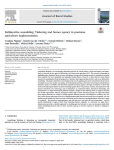
Article
V. Higgins ; D. van der Velden ; N. Bechtet ; M. Bryant ; J. Battersby ; M. Belle ; L. Klerkx |Assemblage thinking is an increasingly influential approach in critical studies of food and farming, and particularly in research on new agri-food technology such as precision agriculture (PA). This research is important in highlighting the dist[...]
Article
S. Wolfert ; C. Verdouw ; L. van Wassenaer ; W. Dolfsma ; L. Klerkx |CONTEXT Digital technologies nowadays play a major role in innovation within the agri-food domain. The evolution of IT systems has currently arrived at a level that involves complex systems integration and business ecosystems in which many stake[...]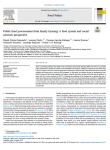
Article
D. Gaitán-Cremaschi ; L. Klerkx ; N. Aguilar-Gallegos ; J. Duncan ; A. Pizzolón ; S. Dogliotti ; W.A.H. Rossing |There is promising evidence that public food procurement from family farming (PFPF) can serve as a powerful policy instrument in transitions towards more sustainable food systems. Despite the evidence around PFPF, there is lack of systemic and a[...]
Article
E. Stephens ; J. Timsina ; G. Martin ; M. van Wijk ; L. Klerkx ; P. Reidsma ; V. Snow |CONTEXT In May 2020, approximately four months into the COVID-19 pandemic, the journal's editorial team realized there was an opportunity to collect information from a diverse range of agricultural systems on how the pandemic was playing out and[...]
Article
A. Hebinck ; L. Klerkx ; B. Elzen ; K.P.W. Kok ; B. König ; K. Schiller ; J. Tschersich ; B. van Mierlo ; T. von Wirth |Dominant agricultural and food systems lead to continuous resource depletion and unacceptable environmental and social impacts. While current calls for changing agrifood systems are increasingly framed in the context of sustainability transition[...]
Article
In the past few years, we have seen growing calls for a transformation in global food systems in response to multiple challenges, including climate change. Food systems are responsible for a third of global greenhouse gas emissions from human ac[...]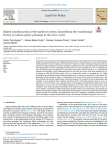
Article
Despite the growing importance of the digital transformation (DT) of the agrifood sector on the political agenda, traditional policies are not enough to provide proactive responses to rapid technological changes and new approaches for policy pla[...]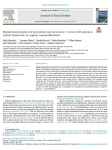
Article
K. Rijswijk ; L. Klerkx ; M. Bacco ; F. Bartolini ; E. Bulten ; L. Debruyne ; J. Dessein ; I. Scotti ; G. Brunori |Digital technologies are often seen as an opportunity to enable sustainable futures in agriculture and rural areas. However, this digital transformation process is not inherently good as it impacts on many aspects (e.g. economic, environmental, [...]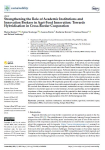
Article
M. Knickel ; S. Neuberger ; L. Klerkx ; K. Knickel ; G. Brunori ; H. Saatkamp |Existing research suggests that regions can develop their long-term competitive advantage through well-functioning interregional innovation cooperation. In this article, we use the example of innovation in small and medium-sized agri-food enterp[...]
Article
Ecosystem services delivery is influenced by food systems and vice versa. As the application of digital technologies in agriculture continues to expand, digital technologies might affect the delivery of ecosystem services in view of the sorts of[...]
Article
Agricultural innovation systems has become a popular approach to understand and facilitate agricultural innovation. However, there is often no explicit reflection on the role of agricultural innovation systems in food systems transformation and [...]
Article
Agriculture 4.0 is comprised of different already operational or developing technologies such as robotics, nanotechnology, synthetic protein, cellular agriculture, gene editing technology, artificial intelligence, blockchain, and machine learnin[...]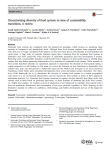
Article
D. Gaitán-Cremaschi ; L. Klerkx ; J. Duncan ; J. Trienekens ; C. Huenchuelo ; S. Dogliotti ; M.E. Contesse ; W.A.H. Rossing |Dominant food systems are configured from the productivist paradigm, which focuses on producing large amounts of inexpensive and standardized foods. Although these food systems continue being supported worldwide, they are no longer considered fi[...]








